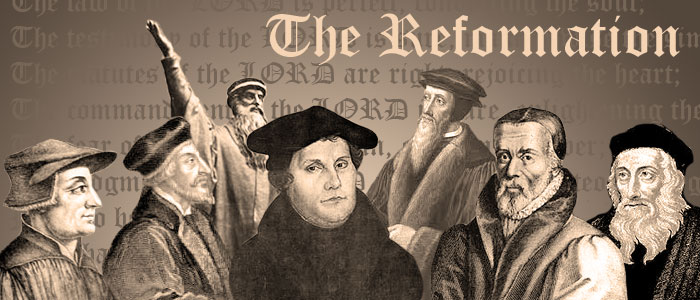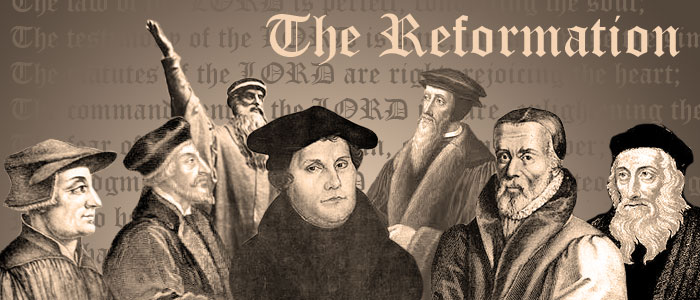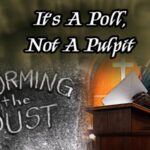“The loss of many Baptists to the cause of Protestantism is one reason why Rome has made such gains in the past century in the United States. It is [an] amazing…ignorance that now exists in many Independent Baptist churches and in the mainline Baptist denominations, about the Protestant Reformation…. It is only in the United States, where the majority of Fundamental Baptist Churches are really Plymouth Brethren assemblies, that Baptists claim they are not Protestants.”[1]
There has been a tendency—particularly throughout the twentieth-century—amongst both fundamentalist and reformed Baptists to want to distinguish themselves from Protestantism. Even the revered Charles Spurgeon is recorded as stating:
“We believe that the Baptists are the original Christians. We did not commence our existence at the reformation, we were reformers before Luther and Calvin were born; we never came from the Church of Rome, for we were never in it, but we have an unbroken line up to the apostles themselves….”[2]
Some Calvinistic Baptists—persuaded though they may be of God’s sovereign grace in salvation—take issue with the label “reformed”.[3] These tendencies are often due to the fact that while Presbyterianism’s roots (for example) are traced with ease to the Protestant Reformation, many Baptists think they owe very little to that great historical movement because they are convinced that Baptist history does not depend on a developing separation from Romanism and the formulation of reformed doctrinal confessions. Many Baptists tend to be under the impression that their roots run parallel and distinct from Protestant Reformation history and therefore do not depend on it. Contrarily, I think it is plainly demonstrable that all Christians—particularly Calvinistic Baptists—owe a great deal to the glorious Protestant Reformation.
In the opening paragraph of Milton Friedman’s essay, Why Government is the Problem, he references a statement which he denotes as his “antitext”; a proposition with which he was “persuaded was wholly wrong”[4] and in need of refutation. It is from this point that he proceeded develop his argument in opposition to the antitext. Many of us Baptists—whether fundamentalist or reformed—have taken for granted a proposition like the one put forth by John Henry Blunt when he wrote that, “…Anabaptists were the fathers of the modern English Baptists”.[5] For this essay, such a notion will serve as our antitext. I will contend that, contrary to Blunt and the pronouncements of many well-meaning Baptists, we do indeed owe our heritage to the Protestant Reformation rather than the amorphous and disparate entity known as Anabaptism. Interestingly, in the margin of my facsimile copy of Blunt’s volume are the following handwritten words: “no connection whatsoever”. It appears that the reader knew something of the fallaciousness of our antitext.
Ron Baines remarks that,
“For polemical reasons the paedobaptists were constantly attempting to mark the Baptists as Anabaptists, a point to which they regularly objected, as can be seen in the title given to their first Confession of Faith; The Confession of Faith, of Those Churches Which Are Commonly (Though Falsely) Called Anabaptists (London: [s.n.], 1644). While polemically it may have been an effective ad hominem technique, it was in reality dishonest.”[6]
For this reason and others, it is absurd to allege that the terms “Protestant” and “reformed” must be used exclusively of Reformed denominations and Presbyterian churches who proudly boast of their sixteenth-century heritage. While I understand the argument of both sovereign grace Baptists and fundamentalists that we must ultimately trace our doctrine and practice directly to the NT, such a claim need not be antithetical to acknowledging and admitting the theological and confessional debt we owe the Reformers.[7] Tom Ascol corrects a common misunderstanding concerning the history of the Baptists:
“Sometimes Baptists live under the mistaken notion that they came into existence with little or no influence from any other evangelical group. Some even believe that Baptist churches have existed from the time of John ‘the Baptist’ to the present. While the principles that Baptists hold dear originate in the Word of God and have been found in various degrees of purity throughout church history, our origin as a distinct group can be traced to the early seventeenth century. We are a Reformational people.”[8]
Some typical objections
As a case in point of this “mistaken notion” to which Ascol refers, consider W.R. Downing’s paper, ‘A Vindication of the Baptists’.[9] This is one attempt at finding an unbroken succession of “Baptistic” churches linking modern Baptists with the Apostles (often referred to as the “Successionist theory”). Baines notes that “while this view is largely abandoned by Baptist scholars today, it is still held by many Baptists and is popularly represented in J.M. Carroll, The Trail of Blood”.[10] Such an endeavor to trace Baptist distinctives to the “primitive church” necessitates a diminished view of reformed theology even by Calvinists because the assertion is that Calvinistic Baptists can trace their roots to the Apostles without going through Luther, Calvin and the other Reformers and the confessions succeeding them.
I do not interact here with William Downing because he is a soft target. He is not. He is a most brilliant pastor, theologian and scholar, and has authored numerous excellent and robust theological works. I would recommend reading as much as you can get your hands on by Downing (some of which is available for free here). He is a dear brother in Christ and I have learned a great deal from his books. I published a very positive review of his epistemological tome The Bible and the Problem of Knowledge[11] in CRSQ and have regarded his Lectures on Calvinism and Arminianism[12] as a tremendously valuable resource on soteriology both for its theological depth and acuteness and detailed historical survey. Readers of this blog will note that I have a high regard for Downing’s work and frequently reference his books in my posts and articles for Journal of Creation. Downing has also written textbooks on Hebrew and Greek as well as many other scholarly works. Even the book from which this paper on Baptist history is taken is recommended for all of its other fine content. I chose to interact with Downing on this subject because he is not a decisional regenerationist, he is not an “SBC traditionalist”[13], he is not a fideistic fundamentalist, he is not an Arminian evidentialist, and according to his own testimony on Iron Sharpens Iron [time stamp: 17:52], he is not a Landmarker.[14] He is a consistent covenantal Calvinist with a high view of Scripture and has high regard for both the First and Second London Baptist Confessions. We are dealing with someone who is doctrinally in our camp, exceedingly qualified to speak to these subjects, and for all intents and purposes is a reformed Baptist (though he dislikes the designation). So, in the big picture, of course, this is a minor point of disagreement I have with Downing. I simply use his paper as a launching pad to deal with some of the arguments put forth by modern Baptists as to their alleged non-Reformational heritage.
Downing takes issue with the term “reformed Baptist” because he believes we should trace our roots through God’s remnant of believers in history from apostolic times until now. And like many other Baptists, he opposes the application of the term “Protestant” to Christians generally, particularly those who are not clearly associated with the magisterial Reformers. He alleges:
“[We are] Baptists not Protestants. We did not come from the Protestant Reformation. Our forefathers, known under different, often derogatory names, have existed from the time of the New Testament. Modern Baptists are the inheritors and progeny of countless hundreds of thousands who have held to the evangelical faith, believer’s baptism and freedom of conscience through the ages. …The name ‘Baptist’ began as ‘Anabaptist,’ or ‘re-baptizer’.”[15]
While Downing favors and quotes from the First London Baptist Confession of 1644[16], he fails to recognize in this particular paper (as noted earlier) that the very title of that confession contains a conspicuous denial that these early Particular Baptists had any link to (or affinity for) Anabaptism (“The Confession of Faith, of Those Churches Which Are Commonly (Though Falsely) Called Anabaptists”). In another work, Downing does recognize this important distinction, but appears to suggest that it is only because of the seventeenth-century Baptists’ desire to distance themselves from “‘Anabaptists’ in the sense of being anarchists and Arminians.”[17] In all due fairness to Dr. Downing, however, in his Lectures on Calvinism and Arminianism he presents four different views on the origin of the Baptists, and in that book it is somewhat unclear which position he believes to be the most accurate.[18]
It is also noteworthy that, contra Downing, the seventeenth-century Particular Baptists deliberately and admittedly followed on the heels of the Westminster divines making no attempt to distinguish their Calvinistic theology and heritage from the Protestant Reformation. Greg Nichols notes that “the Reformed Baptist fathers were not embarrassed to copy verbatim from the Presbyterian fathers of the previous generation when they could do so conscientiously”.[19] Such is demonstrated in the introduction to the Second London Baptist Confession (‘To the judicious and impartial reader’) wherein we find the Particular Baptists’ plain admission of having closely followed both the Westminster Confession and Savoy Declaration:
“…When we observed that those last mentioned did in their Confessions…choose not only to express their mind in words concurrent with the former in sense concerning all those articles wherein they were agreed…we did in like manner conclude it best to follow their example in making use of the very same words with them both in these articles…wherein our faith and doctrine are the same with theirs; and this we did the more abundantly to manifest our consent with both in all the fundamental articles of the Christian religion, as also with many others whose orthodox Confessions have been published to the world on the behalf of Protestants in diverse nations and cities. And also to convince all that we have no itch to clog religion with new words, but do readily acquiesce in that form of sound words which hath been, in consent with the Holy Scriptures, used by others before us; hereby declaring…our hearty agreement with them in that wholesome Protestant doctrine which, with so clear evidence of Scriptures, they have asserted [emphasis added].”[20]
Not only were seventeenth-century Baptists quite cognizant of their Protestant heritage, one would think if a clear line of succession back to the Apostles were discernible three-hundred years ago, these early reformed Baptists would have capitalized on that historical data to help them justify their separatism, ecclesiology and theological distinctives. Rather, consider the following by Kurt Smith:
“From an historical standpoint, Baptists have always been known as ‘people of the Book.’ By this identification, Baptists (since their emergence in 17th century England) had gained the reputation of being that Christian body within Protestantism, whose declaration of doctrine and practice was solely governed and ruled by the Word of God. In fact, the great Reformation principle of sola Scriptura (by Scripture alone) can be argued as finding its fullest expression with Baptists than with any other Protestant group.
This is why church historian, Robert G. Torbet, in his History of the Baptists, made the case that:
‘Baptists, to a greater degree than any other group, have strengthened the protest of evangelical Protestantism against traditionalism. This they have done by their constant witness to the supremacy of the Scriptures as the all-sufficient and sole norm for faith and practice.’[21]”[22]
Smith, following Torbet, rather than separating Baptists from Protestantism at large, is quick to point out that they were the most scripturally devoted body “within Protestantism”, and admits their seventeenth-century heritage.
The fact is, in order for anyone to trace Calvinistic Baptists, General Baptists[23] or any other Christian body back to the Apostles, they are forced to go through a series of very questionable sects. Considering the preponderance of anti-trinitarianism amongst many so-called Anabaptist groups, “questionable” is putting it mildly. Not only is it unprovable that all of these various groups actually held to believer’s baptism by immersion, their doctrinal aberrations should more than disincline us to forcibly trace our roots through them. Consider the broad and diverse groups Downing must list in order to assert that Baptists can trace their roots to the Apostles:
“These believers and churches have been known by various names in history, such as Montanists, Novatians, Donatists, Paulicians, Vaudois, Paterines, Albigenses, Berengarians, Bogomili, Cathari, Gezari, Arnoldists, Petrobrusians, Poor men of Lyons, Waldenses, Lollards, Wyclifites, Bohemian Brethren, Hussites, etc.”[24]
A similar list of alleged Baptist predecessors is given by W.T. Whitley which also includes “…Henricans…Bible Men…Picards, United Brethren, Mennonites [and] Anabaptists”.[25] While Whitley adds Anabaptists to his list, more often the term is used collectively of all of these groups when it is employed by other such writers.
We must note that the lists of supposed Baptist ancestors provided by these men contain some dubious groups indeed. We will not examine the doctrinal distinctives of each of them here, partly because of the lack of information available, partly for the sake of space, and partly because it simply cannot be proven that all of these groups held to believer’s baptism by immersion anyway. It is true that many have been lumped into the broad and practically useless category, “Anabaptist”, but even that label does not prove that they practiced baptism by immersion! More accurately, there have been various people branded Anabaptists simply because they were antipaedobaptists. Their aversion to infant baptism (Romish, or otherwise) did not imply that they held to the doctrine, mode and method of baptism that post-Reformation Baptists adhere to. Ronald Cooke, drawing largely on the work of Baptist historian Albert Henry Newman, writes:
“Newman…says here, plainly, the method by which the first Antipedobaptists of the Reformation were baptized was affusion, not immersion. One of the other Baptist historians…mentions in connection with this decisive step of the Antipedobaptists, that the first group to be baptized were baptized out of a bucket of water…. It is difficult to document immersion before the Reformation times” [emphasis mine].[26]
Church historian George P. Fisher likewise maintains that, “The practise [sic] of immersion was not in vogue at first among the Anabaptists.”[27] And Earle E. Cairns points out that even the esteemed Anabaptist theologian Balthasar Hubmaier, along with three hundred of his followers, “were baptized by affusion.”[28]
On the other hand, the practice of paedobaptism is evident in church history from very early on. It might be a hard pill to swallow, but reformed Baptist theologian Jeffrey Johnson points out that
“No doubt, paedobaptism is a very old and historical practice in the church. One may question if the practice was apostolic, but none can credibly deny its antiquity. Although none of the Patristic writings and church lectionaries of the first and second century refer to infant baptism, by the third century historical records show that some churches carried out the practice.”[29]
The lack of documentation that can substantiate a clear history of immersionists prior to the Reformation alone discredits the idea that a direct path can be traced from modern reformed or fundamentalist Baptists through to the Apostles. Anabaptists as such were a mixed-bag. With no consistency in their mode of baptism and total absence of doctrinal parameters, the term, “Anabaptist” is rendered practically useless for our purposes. It tells us very little about any particular group, and most of the groups placed under that label are not ones any orthodox Christian would want to be associated with.
It is true that amongst the varied and diverse people Downing lists there existed true believers, but it cannot be sustained that they all practiced believer’s baptism by immersion while simultaneously holding to other Baptist distinctives. To acknowledge this is to acknowledge that Presbyterians and evangelicals can equally claim this “pilgrim church”[30]as fellow brethren belonging to the true bride of Christ, being a testimony to the truth that the gates of hell will not prevail against the church. The existence of these pre-Reformation Christians only proves that God has always preserved His remnant. It does not prove that Baptists have the exclusive right to claim these early Christians as ancestors nor does it justify a disregard for the Reformation and the Baptists’ patently obvious Protestant history. Furthermore, as we will see, many antipaedobaptists employed methods and embraced doctrines that any Bible-believing Christian would deride as unscriptural. Is it even worthwhile, then, for us to attempt to trace our roots through them?
Note that some of the groups Downing lists to support his thesis are at the least unorthodox or at most, completely heretical. These groups’ particular method of baptism and view of church-state separation becomes irrelevant at this point since primary doctrines (such as the trinity or proper Christology) were sometimes outright rejected by many of the so-called Anabaptists in history. It is curious that a Calvinistic confessional cessationist[31] like Downing would want to share a common bond with montanists, for example, all for the sake of trying to establish an unbroken doctrinal succession to the Apostles.[32]
In this paper, Downing has nothing critical to say of the Montanists and says that the “movement was orthodox in its doctrine”.[33] He makes no mention of the excesses and charismatic chicanery practiced by those within the movement. I think those not so inclined to trace their doctrine and practice in a continuous line to the Apostles would give a more objective assessment of this schismatic sect. While Downing claims that Montanists predate Montanus himself, I am not sure that such would insulate the group he is referring to from the charismatic behavior which has come to be identified with Montanism in general.
Regarding Montanus, it is noteworthy that like modern charismatics, “[he] gave utterances as though the Lord were speaking directly to him.”[34] Victor Budgen quotes such examples of Montanus’ “revelations” and says, “Here was a man who was undoubtedly, in his own estimation, on a hot line to heaven.”[35] If it weren’t for Downing’s strained effort to find early Baptists in church history, we could be sure that Downing would himself repudiate practically everything they taught as recorded in the Encyclopedia of Heresies and Heretics.[36]
The error of imagining a line of Baptists right through church history is more characteristic of fundamentalists, traditionalists and Plymouth Brethren then it is of confessional Calvinistic Baptists. Let us not fall into this trap. There is no shame in our Protestant, reformed heritage, and acknowledging it means we don’t have to sidestep doctrinal aberrations and make excuses for heretical trends in history. Downing exhibits a very high view of the Reformers and the Protestant Reformation in his Lectures on Calvinism and Arminianism, but in discussing Baptist history the importance of the Reformation is diminished.
Given the choice, I think any Christian would be wise to embrace the heritage they owe the Protestant Reformation instead of inventing a lineage that must necessarily pass through various antitrinitarians, montanists, violent social radicals, theocrats and other assorted heretics who have all been indiscriminately lumped together under the misleading designation “Anabaptist” (so labeled simply because they repudiated paedobaptism). Following the clear NT pattern (and symbolism embedded in the ordinance), it is very likely that most early Christians baptized in the method of the Apostles and restricted the practice to believers only. Certainly, I am convinced along with Downing that the baptism of believers only is the biblical method and was practiced by the NT church.[37] But we must stop short of asserting what cannot be legitimately established with regard to Baptist history. We have limited knowledge of many of the early groups Downing lists, and often what we do know of them is not good.
Downing admits that “the distinctive doctrines of the Donatists were identical with the Montanists and Novatians before them”.[38] David Christie-Murray’s assessment is much the same, noting that the Novatian movement “was heretical in so far as it allied with the Montanists”, and that “the Donatists were in the main orthodox, although some of them were tinged with Arianism….”[39] Should we not be at least a bit cautious in trying to trace our roots through these groups? I am not consigning all of these men and women to hell. There was most definitely a remnant that existed through the ages that never submitted to the mongrel faith-works monstrosity of the Roman church/state. I am simply trying to state the obvious; that much of the information available concerning these people would be enough to exclude them from membership in Downing’s own confessional church. If Downing wants to include Montanists in his Baptist family tree, it follows that he would likewise be obliged to extend their modern counterparts in charismania the right hand of fellowship. I do not think that is something he would be inclined to do.
Cooke notes that there was a strong tendency toward antitrinitarianism even amongst many of whom Baptist historian Albert Henry Newman calls the “sounder” Baptists. He notes that Newman’s sympathies to the concept of an unbroken line of succession force him to have a sympathetic tone concerning the heretical nature of their teachings. Cooke writes:
“Some non-Baptists would not describe men who denied the Trinity as being sound in their theology. To say they ‘fell considerably short of the orthodox view of the Person of Christ’ is a euphemistic way of saying that they denied the humanity of Christ. And to say that such men who taught the Adoptionist Christology were like many of the medieval evangelicals is again stretching the point in an effort to save them from the charge of heresy. For some non-Baptists would be more apt to call such medieval men heretics rather than evangelicals. Yet, this is the line to which any Baptist unbroken line must be linked.”[40]
We have seen some of the difficulties in formulating an historical line of succession from the Apostles to modern Baptists. I will briefly address one more point with regard to our theological heritage.
Baptist covenant theology has a Reformational heritage
Coming out of dispensationalism, some of us held a low view of the historic creeds and confessions and possessed an abysmal knowledge of church history. I believe this was no accident, for to know church history would be to admit the newness of dispensationalism as a “unified interpretive scheme”.[41] This is consistent with the allegation by Cooke that fundamentalist Baptists have more in common with Plymouth Brethren than they do with historic covenantal Baptists.[42] Fred Malone likewise notes that “English Baptists and their descendants in America originally were covenantal Baptists until the 1900s (see Philadelphia and Charleston Confessions). It was not until Dispensationalism spread among Baptists after 1900 that non-covenantal Baptists took the ascendancy.”[43] Jim Renihan’s comments comport with this assessment. Despite the once wide acceptance of the 1689 Confession by Baptists in England and America, by the early twentieth-century, “Baptists were swept away by powerful movements, each of which challenged and altered their theological commitments…[namely,] Revivalism, Modernism, Fundamentalism, and Dispensationalism.”[44]
For myself, I was merely Baptistic by default (and inherited a Dispensational hermeneutic from my non-denominational church). That is, I found no evidence of infant baptism in the NT and that was enough to dismiss such a practice as unbiblical. “Believer’s baptism”, seemed to both follow logically and be consistent with the historical record found in the book of Acts, but I had no real grasp of the other historic Baptist distinctives or how those issues related to other evangelical doctrinal distinctives.
Instead of regarding Presbyterians as compromising Christians who simply hadn’t purged a residual Romish tradition, a mere “trapping of popery”[45], it would have been far more beneficial to have pursued a basic knowledge of the theory employed to justify paedobaptism. In other words, I think many twentieth-century Baptists were Baptists only to the extent that they immersed believers, as Ron Cooke noted earlier.1 They were unaware of the rich hermeneutical system which seemingly undergirded both the practice of paedobaptism and Baptist opposition to it. Only recently are we reclaiming our confessional and covenantal heritage. Today there is a wealth of literature available detailing the doctrine, history and distinctives of Baptist Covenant theology.[46]
Commendably, Downing embraces and defends Baptist covenant theology in multiple books and properly distinguishes it from both paedobaptist covenant theology and dispensationalism. But I think he would be hard-pressed to uncover a chain of local churches through which he might trace this comprehensive theological system back to the early NT church. We do believe that covenant theology (with its Baptist distinctiveness, such as what is sometimes called 1689 federalism) is a thoroughly biblical and valuable hermeneutic. But just like eschatological schemes, not all hermeneutical systems and doctrinal frameworks were formally and systematically worked out by the first-century. Downing should simply admit what reformed Baptist author Pascal Denault notes, that “this approach to Scripture [Baptist covenant theology] was born of the Protestant Reformation”[47], and, unlike many modern Baptists, seventeenth-century Baptists
“were concerned with identifying themselves with the heritage of the Reformation. This explains the close relationship of their official documents to those of the other reformed movements. This desire for unity did not keep them from stating their distinct convictions within these same documents. Nevertheless, they always did it with irenic attitude.”[48]
The Baptist covenant theology which Downing and other doctrinally reformed Baptists rightly embrace and defend cannot be linked to the various Anabaptist groups antecedent to the Protestant Reformation.
Conclusion
I close off this post with some final thoughts by my dear friend Ronald Cooke (evangelical Methodist), followed by some pertinent remarks from reformed Baptists James Dolezal and Sam Waldron:
“The [Ana]baptist movement of the sixteenth century was a great hodge-podge of many different ideas and teachings, some of which would definitely be classed as heretical today by just about every believer in a fundamental Bible-believing church. And there is scarcely one man, whose teachings we know anything about in detail, whom any Fundamental Baptist would agree with today. In other words, the only link that Baptists today would have with such men is water baptism, and even some of those, whom Newman classes as the sounder biblical Baptists of the sixteenth century practised [sic] affusion, not immersion….
“To say that we never came out of Rome because we were never in Rome cannot be documented at all by any historical evidence which now exists. Almost everything we know about the men of the lower middle ages, the men of the higher middle ages, and the sixteenth century dissenters, suggests that the reformatory movements came out of the hierarchical Church, or from some man who had separated from it.”[49]
“…It was not until the time of the Protestant Reformation that a clear break was made which was based upon a sound hermeneutical approach to the Scriptures, and which resulted in a sound theology which taught clearly salvation by grace alone, justification by faith alone and that Christ’s perfect righteousness is imputed to the believing sinner by faith alone.”[50]
James Dolezal:
“…There is no evidence for any real connection between Anabaptist activity on the continent and the development of Baptistic conviction in England a century later. There’s no evidence that they were reading Anabaptist theology, [or] that they even understood the broad strokes of Anabaptist theology….
There’s nothing telling us that either the general Baptists or the particular Baptists drew their Baptist views from Anabaptism. [As the title of the First London Baptist Confession of 1644 attests] the Particular Baptists are very self-aware that that is not their tradition. The Baptist movement is not tweaking Anabaptism, so to speak. The Particular Baptists and the Anabaptists don’t even agree on a definition of what baptism is. It may look the same externally but they don’t even agree theologically about what is actually happening at the moment of baptism. On the flip-side, Baptists do agree with their Presbyterian brethren not on who ought to receive baptism, but we do agree with them on a definitional level of what baptism signifies and is intended to accomplish toward the believer.
So interestingly on the definitional level, the Particular Baptists are much more agreed with Calvin and the Presbyterian tradition than they are with the Anabaptists. It’s not entirely clear that they are even thinking of Anabaptism…as an option in the seventeenth-century.”[51]
Sam Waldron (original bibliographic data from Waldron’s book has been reformatted and included in the endnotes):
“[Our Baptist fathers in the faith] wished to show their unity with their Reformed and Puritan brethren. In the preface to the Confession when first published in 1677 they state that their purpose is to show, ‘our hearty agreement with them (Presbyterian and Congregationalists) in that wholesome protestant doctrine, which, with so clear evidence of Scriptures they have asserted.’[52]
One must admire the wisdom shown by these Baptist fathers. It would have been the easiest thing in the world for them, persecuted as they had been by many of their Puritan brethren, firmly as they disagreed with their errors, to react by putting as much distance between themselves and the Congregationalists and Presbyterians as possible. This they did not do. They sensed that novelty is often just another word for heresy. They showed an awareness that the true church of Christ is catholic [small ‘c’; universal] in the right sense. Thus, they sought to emphasize not their party distinctives, but their oneness with historic Christianity.
…Both the First and Second London Confessions were intended to distance the Particular Baptists from the Anabaptists. Those who wish to trace their lineage back to the Continental Anabaptists may do so, but they must be willing to renounce their claim to a Particular Baptist heritage. It may be that one can discern a certain sympathy for the persecuted Anabaptists in certain sections of the 1689 Confession. It may also be that a general or indirect influence from Continental Anabaptists encouraged some to consider believer’s baptism. Nevertheless, the immediate roots of the Particular Baptist churches which sprang up in London and, then, Britain at large were the separatist, Puritan churches which later became known as Independent or Congregational.[53] This movement was led by men such as Thomas Goodwin, John Owen, Philip Nye, William Bridge, and Jeremiah Burroughs. Many of these men sat in the Westminster Assembly[54] and, thus, their Puritan identity is undeniable. Well over 90% of the paragraphs found in the 1689 Confession are found in the Savoy Declaration written by Congregationalist Puritans. It is simply historical ignorance or theological prejudice which causes men to deny that Baptists may be Reformed. Whether this objection proceeds from those in traditional Reformed denominations or from those in Baptist circles, it cannot stand the light of historical examination” [emphasis added].[55]
Fellow Baptists, while the Romanists and ecumenists are lamenting Luther’s protest, while both liberals and Fundamentalists have forgotten it, let us celebrate the 500th year anniversary of the Protestant Reformation with our Presbyterian and reformed brethren. We would do well to recognize the great debt we owe those theological giants who went before us. We are children of the Protestant Reformation, not of the Anabaptists.
May God grant us the grace necessary to continue the work of the Reformers. Let us never forget Luther’s fight,[56] and let us boldly proclaim those foundational five solas.[57]
I, for one, am a Protestant Reformed Baptist.
[1] Cooke, R.N., Antichrist Exposed: The Reformed and Puritan View of the Antichrist, Truth International Ministries, Max Meadows, VA, 2006, vol. 1, p. 330.
[2] Spurgeon, C.H., The Metropolitan Tabernacle Pulpit, Pilgrim Pub., Pasadena, TX, 1969, vol. 7, p. 225.
[3] As perhaps they should, seeing that Calvinism alone is insufficient to earn the designation “reformed” (typically included in the definition is confessionalism and covenantalism, theological commitments which many modern Calvinistic Baptists lack).
[4] Friedman, M., Why Government is the Problem, Hoover Institution Press, Stanford, CA, 1993, p. 1.
[5] Blunt, J.H., The Reformation of the Church of England: Its History, Principles and Results, Vol. 1 A.D. 1514—1547 (8th edition), Longmans, Green, and Co., New York, 1897, p. 551.
[6] Baines, R., “Separating God’s two kingdoms: Two kingdom theology among New England Baptists in the early republic,” Journal of the Institute of Reformed Baptist Studies, 2014, p. 51 (footnote 54).
[7] Ryle, J.C., What Do We Owe the Reformation?, Protestant Truth Society, London, Obtain a reprint here.
[8] Ascol, T.K., From the Protestant Reformation to the Southern Baptist Convention: What Hath Geneva to do with Nashville? (revised edition), Founders Press, Cape Coral, FL, 2013, p. 11.
[9] Downing, W.R., Selected Shorter Writings, PIRS Publications, Morgan Hill, CA, 2013, pp. 231—283.
[10] Baines, ref. 6, p. 44 (footnote 40).
[11] Downing, W.R., The Bible and the Problem of Knowledge, PIRS Publications, Morgan Hill, CA, 2006.
[12] Downing, W.R., Lectures on Calvinism and Arminianism (rev. ed.), PIRS Publications, Morgan Hill, CA, 2007.
[13] Another misnomer thoroughly refuted once and for all by Kurt Smith and Brandon Smith in The Gospel Heritage of Georgia Baptists: 1772-1830, Solid Ground Christian Books, Birmingham, AL, 2017.
[14] “Landmark Baptists particularly emphasized the local, visible congregation as being the church in its true form, and they opposed the idea of an actual universal church” (Bush, L.R., and Nettles, T.J., Baptists and the Bible, Moody Press, Chicago, IL, 1980, p. 378). In contrast to Landmarkism, the Second London Baptist Confession of Faith of 1677/1689 affirms the existence of a universal church. This is partly why Downing evinces a preference for the First London Baptist Confession of Faith of 1644/1646. Sam Waldron comments that, “The New Testament does speak of a universal church (Matthew 16:18; 1 Corinthians 12:28; Ephesians 1:22; 4:11—15; 5:23, 24, 25, 27, 29, 32; Colossians 1:18, 24; Hebrews 12:23). Such passages refute Landmarkism and its denial of a universal church” (Waldron, S.E., A Modern Exposition of the 1689 Baptist Confession of Faith [5th ed.], EP Books, Welwyn Garden City, UK, 2016, pp. 366—67). While Downing claims he is not a Landmarker, it is sometimes difficult to see precisely where he differs from Landmarkism.
[15] Downing, ref. 9, p. 236.
[16] Downing, ref. 9, p. 257.
[17] Downing, ref. 12, p. 396 (footnote 1098).
[18] See Downing, ref. 12, pp. 395—417.
[19] Nichols, G., Covenant Theology: A Reformed and Baptistic Perspective on God’s Covenants, Solid Ground Christian Books, Birmingham, AL, 2011, p. 5.
[20] The Baptist Confession of Faith & The Baptist Catechism (1677) Solid Ground Christian Books, Vestavia Hills, AL, 2010.
[21] Robert G. Torbet, History of the Baptists (revised edition), Judson, Valley Forge, PA, 1963, p. 483.
[22] Smith, K., The only rule, Founders Journal 104, March 14, 2016.
[23] “From their beginnings in the seventeenth century, Baptists on both sides of the Atlantic were thoroughly covenantal. Formulating their doctrine in the familiar terms of Reformed orthodoxy, they built a theological system that was easily recognized by all strands of churches coming out of the Reformation. …This statement may be made of General Baptists as well.” (Renihan, J.M., Introduction, in Barcellos, R.C., (ed.), Recovering A Covenantal Heritage, Reformed Baptist Academic Press, Palmdale, CA, 2014, p. 13).
[24] Downing, ref. 9, p. 236.
[25] Whitley, W.T., The Witness of History of Baptist Principles, pp. 97—98, as cited in The Baptist Tract Series, No. 2, The Baptist Standard Bearer, Paris, AR, 1987, p. x.
[26] Cooke, R., Some Modern Baptists and the Protestant Reformation, Truth International Ministries, Max Meadows, VA, 2007, p. 15.
[27] Fisher, G.P., History of Christian Doctrine, Charles Scribner’s Sons, New York, 1916, p. 319.
[28] Cairns, E.E., Christianity Through the Centuries, Zondervan, Grand Rapids, MI, 1981, p. 306.
[29] Johnson, J.D., The Fatal Flaw of the Theology Behind Infant Baptism, Free Grace Press, 2010, pp. 3—4.
[30] Broadbent, E.H., The Pilgrim Church (1931), Gospel Folio Press, Port Colborne, ON, 2009.
[31] Downing, W.R., Theological Propaedeutic, PIRS Publications, Morgan Hill, CA, 2010, p. 162.
[32] Again, Downing does not claim to be a Landmarker, but his arguments here seem to be characteristic of that camp.
[33] Downing, ref. 9, p. 262.
[34] Budgen, V., The Charismatics and the Word of God (2nd ed.), Evangelical Press, England, 1989, p. 116.
[35] Budgen, ref. 34, p. 117.
[36] Clifton, C.S., Encyclopedia of Heresies and Heretics, Barnes & Noble, New York, 1992, pp. 98—99.
[37] For a thorough treatment of this position, see Malone, F.A., The Baptism of Disciples Alone: A Covenantal Argument for Credobaptism Versus Paedobaptism (2nd ed.), Founder Press, Cape Coral, FL, 2007.
[38] Downing, ref. 9, p. 265.
[39] Christie-Murray, D., A History of Heresy, Oxford University Press, New York, 1976, p. 96.
[40] Cooke, ref. 26, pp. 20—21.
[41] Erickson, M.J., Christian Theology (2nd edition), Baker Academic, Grand Rapids, MI, 1998, p. 1168.
[42] In 1875, James Grant noted that the Plymouth Brethren “are so very active in their endeavors to make proselytes, and are so continually involved in controversies and quarrels among themselves, that they are more frequently before the public than sects of Christians who are more numerous…. [They] are indeed at once the most active and most noisy sect of which we have any record in the annals of Christianity.” (The Plymouth Brethren: Their History and Heresies, London, 1875, p. 66 [Leopold Classic Library reprint]).
[43] Malone, F.A., Biblical hermeneutics and covenant theology, in Blackburn, E.M. (ed.), Covenant Theology: A Baptist Distinctive, Solid Ground Christian Books, Pelham, AL, 2013, p. 63.
[44] Renihan, ref. 23, p. 14.
[45] While I agree with this assessment of paedobaptism by Shaun Willcock (Trappings of Popery, New Voices Publishing, Cape Town, South Africa, 2007, pp. 20—24), to ignore the particular version of covenant theology used to undergird this practice by Presbyterians means we have failed to interact with them at any honest intellectual level. Some of the strongest opponents of Romanism have retained paedobaptism not because they have some innate desire to retain papal traditions but as an allegedly “necessary” consequence of their own particular covenant theology.
[46] Consider the work of Reformed Baptist Academic Press, 1689 Federalism and Founders Ministries.
[47] Denault, P., The Distinctiveness of Baptist Covenant Theology, Solid Ground Christian Books, Birmingham, AL, 2013, summary page.
[48] Denault, ref. 47, pp. 10—11, footnote 13.
[49] Cooke, ref. 26, p. 23.
[50] Cooke, ref. 26, p. 24.
[51] James Dolezal, “Baptists during the Reformation” 12/11/2011, 2:40-5:10
[52] As quoted by William L. Lumpkin, Baptist Confessions of Faith, The Judson Press, Chicago, IL, 1959, p. 236.
[53] Hulse, E., An Introduction to the Baptists, Carey Publications, Haywards Heath, 1973, pp. 17—18.
[54] The New Schaff-Herzog Encyclopedia of Religious Knowledge, Vol. III (Chamier-Draendorf), Funk and Wagnalls, New York, 1909, p. 233; Note also the comments of Williston Walker in The Creeds and Platforms of Congregationalism, Pilgrim Press, Philadelphia, 1969, pp. 340—353.
[55] Waldron, S.E., A Modern Exposition of the 1689 Baptist Confession of Faith (5th ed.), EP Books, Welwyn Garden City, UK, 2016, pp. 498—500.
[56] Smith, K.M., Remembering Luther’s Fight, Solid Ground Christian Books, Vestavia Hills, AL, 2017.
[57] Samson, J., The Five Solas, Solid Ground Christian Books, Vestavia Hills, AL, 2017.
[Editor’s Note: This was contributed by Nick Sabato, and first published at No Peace with Rome]













